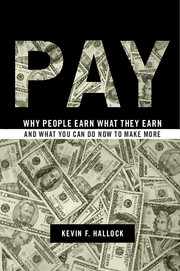Book contents
- Frontmatter
- Contents
- Figures
- Tables
- Acknowledgments
- PART I HOW HARD CAN THIS BE?
- PART II HOW ORGANIZATIONS SET PAY STRUCTURE AND WHY
- PART III HOW PEOPLE ARE PAID CAN MEAN AS MUCH AS HOW MUCH THEY ARE PAID
- 9 Evaluating Performance, Incentives, and Incentive Pay
- 10 Stock and Stock Options
- 11 Pay Mix
- 12 International Compensation
- 13 Compensation in Nonprofit Organizations
- PART IV WHAT YOU CAN DO TO MAKE MORE AND CONCLUDING COMMENTS
- Notes
- References
- Index
11 - Pay Mix
Why Offer Benefits? Would Employees Prefer Cash?
from PART III - HOW PEOPLE ARE PAID CAN MEAN AS MUCH AS HOW MUCH THEY ARE PAID
Published online by Cambridge University Press: 05 October 2012
- Frontmatter
- Contents
- Figures
- Tables
- Acknowledgments
- PART I HOW HARD CAN THIS BE?
- PART II HOW ORGANIZATIONS SET PAY STRUCTURE AND WHY
- PART III HOW PEOPLE ARE PAID CAN MEAN AS MUCH AS HOW MUCH THEY ARE PAID
- 9 Evaluating Performance, Incentives, and Incentive Pay
- 10 Stock and Stock Options
- 11 Pay Mix
- 12 International Compensation
- 13 Compensation in Nonprofit Organizations
- PART IV WHAT YOU CAN DO TO MAKE MORE AND CONCLUDING COMMENTS
- Notes
- References
- Index
Summary
An important puzzle with respect to how people are paid is the issue of why some organizations offer benefits and others do not. Or, more specifically, why some organizations offer certain benefits and others do not. One example, which we will get to later, is health insurance. Why are some employees “paid” with health insurance benefits whereas others are not? One of the ways I am paid as a professor at Cornell University is salary. I am also provided (“paid”) health insurance. In addition, as stated earlier, Cornell has agreed to pay one-half of each of my children's college tuition for each child who attends Cornell. The university has also agreed to pay thirty percent of tuition if my children attend another college or university.
Why does Cornell offer a lower “rate” if my kids go elsewhere? Probably because it is relatively less expensive (for Cornell) if my kids go to Cornell rather than somewhere else, because the additional cost of my kids attending Cornell (or any additional student) are relatively low to Cornell. This isn't entirely correct because Cornell can always fill all seats with other paying students.
Information
- Type
- Chapter
- Information
- PayWhy People Earn What They Earn and What You Can Do Now to Make More, pp. 135 - 140Publisher: Cambridge University PressPrint publication year: 2012
